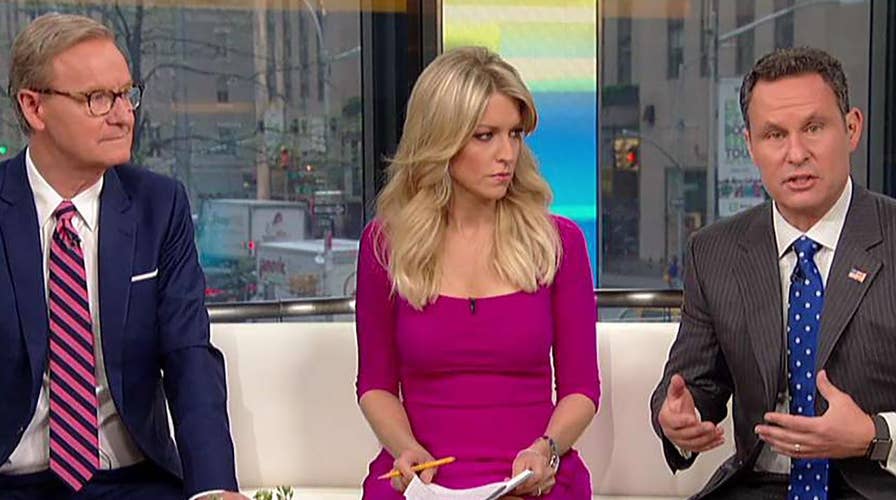Giuliani sets terms of possible Mueller interview
Giuliani says Trump interview would be 2 to 3 hours maximum. President Trump's attorney speaks out about special counsel on 'Fox & Friends.'
President Trump has been warned Special Counsel Robert Mueller’s team could issue him a subpoena in an effort to force his hand to testify, his former attorney said.
John Dowd, who resigned as Trump's lead lawyer on the Russia investigation in March, reportedly raised the possibility of a subpoena during a meeting with the president’s legal team before he left.
Mueller, 73, took over the federal government’s probe into alleged collusion between Trump’s campaign and Russian officials in May 2017. Since then, Trump has repeatedly derided the investigation as a “witch hunt” and denied any collusion.
Read on for a look at the subpoenas other presidents have faced and what that could mean for Trump.
Have presidents been subpoenaed before?
Yes -- and twice in modern history.
Most recently, former President Bill Clinton was subpoenaed by prosecutor Ken Starr in 1998. He was ordered to testify about his relationship with White House intern Monica Lewinsky. However, Clinton agreed to voluntarily testify, possibly staving off a legal challenge to the subpoena on constitutional grounds -- although it did lead to his impeachment. It was the first time a sitting president testified under oath in a criminal investigation in which he was a potential target.
Former President Richard Nixon was also issued a subpoena by the Senate Watergate Committee, which requested tapes and other documents related to the Watergate scandal in 1973. Nixon refused, sparking a 1974 Supreme Court case that ruled against the president, ordering him to hand over the requested materials.
Nixon turned over the documents, and then resigned.
In 1807, Thomas Jefferson was issued a subpoena that ordered him to testify in the treason trial of his former vice president, Aaron Burr. Burr had already killed Alexander Hamilton by this point and was on trial following his plot to invade parts of Mexico and establish a territory for him to rule over was revealed, according to History.com.
Jefferson reportedly did not show up to the Richmond, Virginia, court to testify, but he did turn over a few documents and made himself available to investigators in Washington. His refusal to fully comply with the subpoena was not legally challenged.
In the end, Burr was exonerated by a Supreme Court justice who ruled there was not enough evidence to convict him.
Does that mean Trump could be forced to testify?
Even though the Supreme Court has never issued a specific ruling to clarify this question, it appears the president could be forced to testify.
Nixon, for example, was required by the nation’s highest court to comply with the subpoena and turn over White House tapes.
Trump could invoke his constitutional right not to testify against himself and decline to answer questions, but that act could also pose a significant political risk.
“As a practical matter, the president would have the ability to refuse to answer practically any question,” Bill Jeffress, a veteran Washington defense lawyer who was involved in Nixon’s defense, told The Associated Press. “He has to give his name, his occupation and that sort of thing. But any questions about his official activities or campaign activities, he can just refuse to answer.”
The president could seek a court order to quash the subpoena, though it's not clear that he would have any success.
What else is going on with the Russia investigation?
Trump’s legal team has made some new additions of late with former New York City Mayor Rudy Giuliani and Washington lawyer Emmet Flood, who counseled Clinton during his impeachment trial.
In an interview with Fox News, Giuliani called for Attorney General Jeff Sessions, who recused himself from the Russia investigation, to “close” Mueller’s probe, arguing the “basis of the case is dead.”
Trump has denied speculation about plans to fire Mueller, despite criticizing the investigation. His only tweets pertaining to subpoenas, specifically, are about former Secretary of State Hillary Clinton’s email scandal.
So far, Mueller's investigation has led to charges for four men who were part of the Trump campaign -- George Papadopoulos, Michael Flynn, Paul Manafort and Rick Gates, though none of the charges are directly related to any misconduct by the president's 2016 campaign.
Alex van der Zwaan, an attorney, is the only person to have been sentenced. He received 30 days in prison after pleading guilty to lying to investigators about his contacts with senior Trump campaign official Gates as part of the Russia probe.
The Associated Press contributed to this report.





